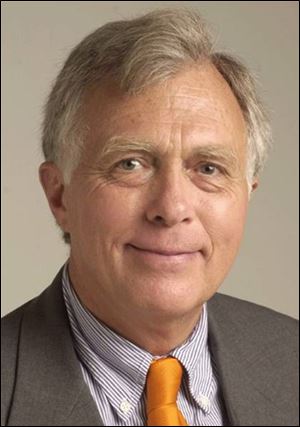
The phenomenon that is Morocco
11/23/2005
Dan Simpson, a retired diplomat, is a member of the editorial boards of The Blade and Pittsburgh Post-Gazette.
MY WIFE and I went to southern Morocco for a two-week vacation this month. We enjoyed the sunshine, rode camels into the desert, appreciated the high sierras of the Atlas Mountains, and were caught up by the romance of the elaborate red-mud-walled castles.
At the same time I couldn't visit a country for that long and not try to make sense of it politically. Morocco is a real challenge, because it is sometimes the odd man out in the Middle East, Africa, and the world politically.
It is geographically unique in Africa since it has coasts on both the Mediterranean Sea and the Atlantic Ocean, making it, in effect, a cornerstone of the continent. That status puts Egypt in the heart of the Middle East fray, but not Morocco. In Africa, Morocco stays more or less aloof from the rest of it and its form of government is unique.
King Mohammed VI is the 15th in a line of Alaouite monarchs who have ruled Morocco for 337 years, since 1668. He is 42, somewhat modern in his approach, and Morocco calls itself a constitutional monarchy. It has more or less democratic elections, the most recent having taken place in 2003.
At the same time, the king maintains significant authority. It is based, as it always has been, on a general consensus that the country is better off ruled by a king. That consensus is composed of the urban elite, the back-country and mountain Berber tribes, and the Islamic clergy. The muscle of the consensus, when required, is provided by firm Alaouite control of the military, the police, and the other security services.
That does not mean that royal authority has not been challenged regularly across the years. Mohammed VI's father, Hassan II, was subjected to assassination attempts, near misses. At one point, army cadets opened fire on the king and his guests at a royal reception. At another, air force jets attacked the king's plane in the air. But they never got him and the succession to his son occurred after Hassan died at 70 of natural causes in 1999.
Morocco has had some of the usual trouble with Islamic fundamentalists. The most recent incident was a terrorist attack in Casablanca in 2003 which killed 33. Moroccan authorities arrested 17 alleged terrorists this week; two of them had been released from U.S. detention at Guantanamo Bay. Moroccan security authorities are reasonably efficient. They have carried out assassinations of government opponents, including in Europe.
One of the characteristics of a population that favors a consensus leader, if it is possible, is that it is terribly divided. There are many, many different Berber and Arab tribes. Berber-speakers make up at least 40 percent of the population. They lead a different life, in the Atlas and Anti-Atlas mountains, and, principally, in the desert.
Other than the Berber-Arab split, such as it is, many different peoples have come to Morocco and been absorbed into the population. Although the government and the country as a whole, which is 99 percent Muslim, turned against the country's Jews at the time of the 1967 war, in effect driving them out, it is nonetheless the case that Jews not only played, but are acknowledged to have played, an important role in the life of the country for many centuries. New Israeli Labor Party leader Amir Paretz is a Moroccan Jew.
Standing on the porch of a shop in the high Atlases with a Moroccan merchant while my wife shopped, I was told that he was a Berber and that Berbers were different from other Moroccans. He then added, in illustration, that there was a Jewish cemetery in his village that was still well tended, even though all the Jews were gone.
That takes us to another odd phenomenon of Morocco, odd in the context of the 21st century.
There are still Spanish colonial enclaves on the Mediterranean coast, including port cities, one named Ceuta and another, Melilla. They are relics of the period when Morocco had been sawed into colonial territories and spheres of foreign influence by France, Spain, Turkey, Germany, the United Kingdom and, to a lesser extent, the United States.
The Spanish enclaves are small. If the Moroccans were to decide one fine day to walk into them as they did into the Spanish Sahara in 1975, the Spanish would be too embarrassed to fight, and, if they did fire on the Moroccans for their anti-colonial, liberating action, would be roundly condemned by virtually the whole world.
But the Moroccans don't act. They seem in some ways comfortable with the presence of the Spaniards at these gateways to their country. Spain greases the wheels with substantial aid to Morocco, supplementing the country's earnings from agriculture, tourism, remittances from workers abroad, and mining. In the days of the Barbary coast, the Moroccans would have called it tribute.
One last Morocco story to illustrate its uniqueness. Some of its goats climb trees. There is an oil called argan that is much appreciated, more by Europeans than by Americans or Moroccans, for its beauty-enhancing attributes as well as for its taste. (It is actually rather good on salad.) It comes from nuts that the goats process through their digestive systems. People don't want to climb the trees that produce the nuts because the leaves are lacerative. So the goats, who don't mind, go up the trees and eat the leaves and nuts. And then take it from there.
Only in Morocco. It is a very old society, rich in its uniqueness. Long may it live.
Dan Simpson, a retired diplomat, is a member of the editorial boards of The Blade and Pittsburgh Post-Gazette.